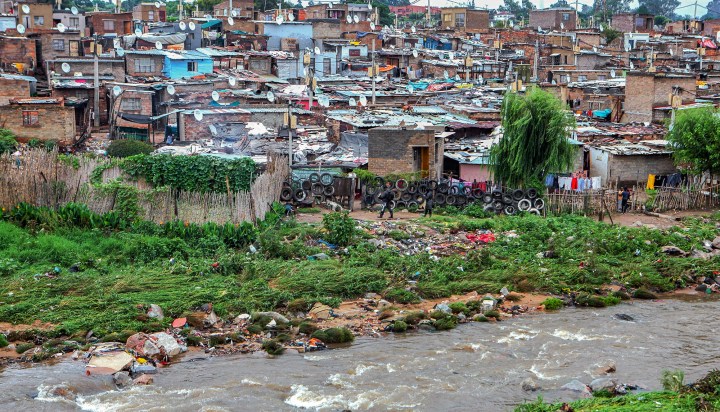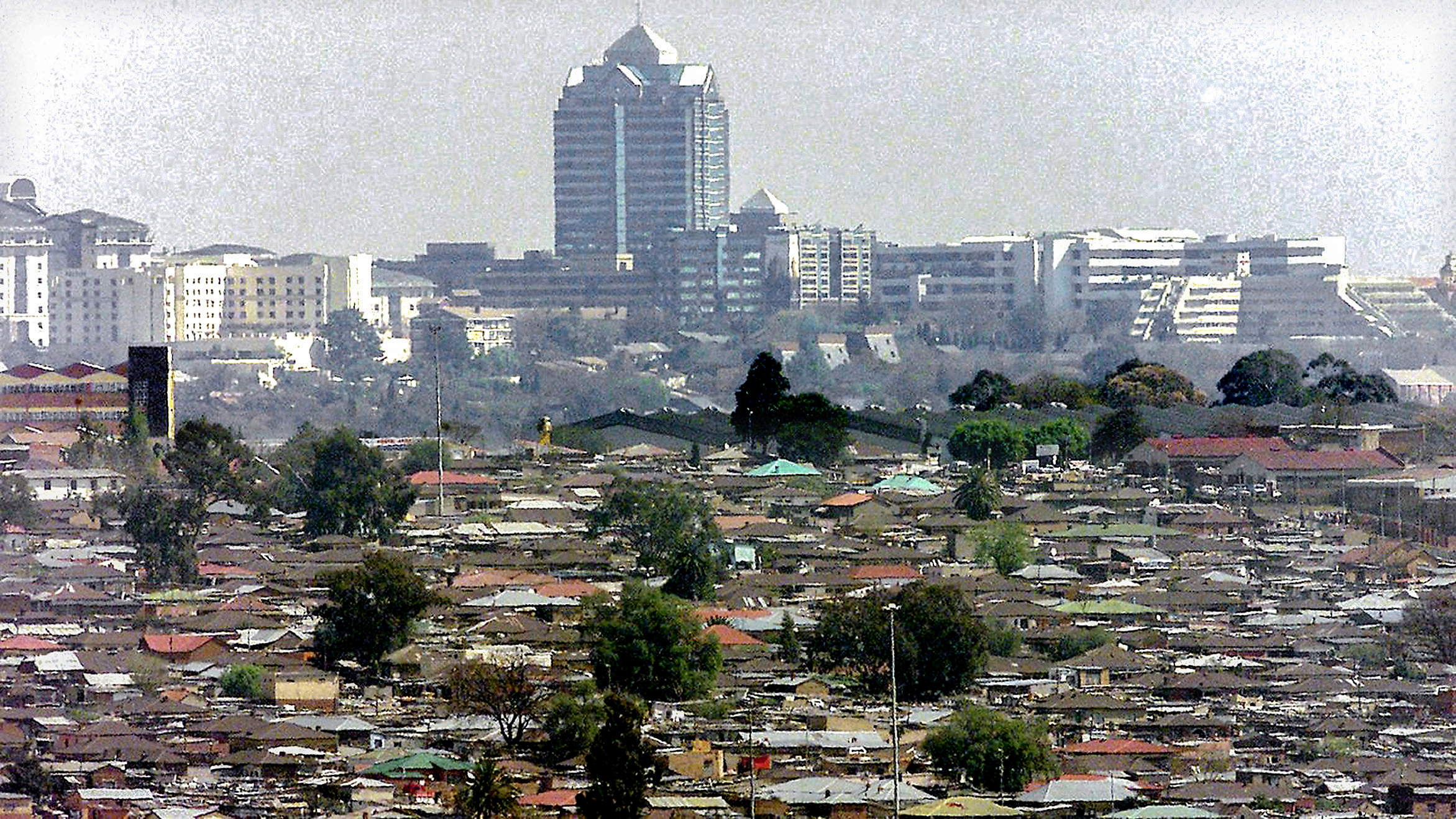#YOUTHRISING2022 REFLECTION
Life in Alex — I will not grow old here

The invisible line between wealth and poverty for South Africa’s youth.
Hi, my name is Mary-Ann Nobele and I am 23 years old, talkative, ambitious, tenacious and currently juggling five jobs. I am also an Alexandrian and simply put, I need to get out of here.
Don’t get me wrong. I love the township’s vibe, the music and the energy. You can basically get anything you need here and there’s nothing better than sharing a house and spending time with my gran. Let’s also not forget some of the greats that have their roots here, including world-renowned jazz maestro, Hugh Masekela. Alex has a long, proud history — in fact, Madiba himself said: “Life in Alexandra was exhilarating and precarious. Its atmosphere was alive, its spirit adventurous, its people resourceful.” Aside from these sentiments, the reality residents, and especially the youth, experience every day is becoming progressively difficult to ignore. For 100 years people have been hustling to survive here, and every time you take a breath, Alex seems to get worse.
Compared to the majority of Alex’s young people, 70% of whom are unemployed, why has my life turned out so differently? Maybe because my gran was lucky enough to place my mom in a “white school” and I followed suit, or was it because my family didn’t see themselves as “us and them” but rather just people contributing to society? Perhaps this gave them a certain air of confidence, a particular drive to both set and reach their goals. My gran’s first boss also assisted her in buying the house we live in today; support everyone else definitely did not receive. Could it be my mom’s energetic mindset that allowed her to climb her way up the corporate ladder (you have to work hard, people aren’t going to promote you just because they like you, she’d always say). Cue Mzansi’s version of the famous Forrest Gump quote: “Mary-Ann, life is like crazy eights — you have to do the best you can with the hand you have been dealt. You may want to reshuffle, but you can’t.”
When I was younger I couldn’t quite understand what differentiated the townships from suburbia. Initially, I thought it must be the trees! All wealthy suburbs have trees lining the pavements, providing forgiving shade to the runners, dog walkers and the Jones’ prize-winning garden. Maybe, if I encouraged people to plant trees, saving the environment at the same time, we’d see drastic changes. When this didn’t seem to work I realised, wait, my school had extra-curricular activities that we had to participate in. Maybe the situation in Alex is the result of youth having nothing to do after school? Well, after sharing a desk in a crowded classroom, using a long drop toilet during break and sitting uncomfortably on the floor for the rest of the day, who would have the energy to play sports?
Ok, unmistakably, it must be the river that separates “Alex 1” and “Alex 2” (you know the one). Could it be that whichever side you live on ultimately determines your fate? My gran and mom lived in “Alex 1” originally, and moved to “Alex 2” (the better side of the tracks, or river, so to speak) during the 1980s. Unfortunately, what I’ve come to notice is that the differences between the two locations aren’t that apparent anymore. Added to rapid population growth, everyone in Alex is struggling, extra rooms and every available inch of space are being used for rental income, and teenage girls without babies are few and far between.
The invisible line
How is it that one main road can so sharply divide the rich and the poor? The unsettling juxtaposition of affluence and squalor, the hopeful and the hopeless. This not only pertains to Alex and Sandton but also to Diepsloot and Fourways and Thembisa and Waterfall. A big house in a township would never sell for the same price even as an apartment across the way, despite being so close in proximity. Even during apartheid, there were places “meant for black people,”’ which seemingly has not changed. You have the main, big house in the suburbs and the tiny helper’s room in the back. To me, Sandton serves as the fancy house and the township, the maid’s quarters. The people of Alex are responsible for ensuring that the house is immaculately clean, presentable and profitable and then go back home to sleep in a tin shack.

Alexandra township and Sandton, Gauteng — a dichotomy of poverty and wealth.
(Photo: Quartz Africa)
We all had hope that post-democracy, focus would be placed on improving townships as the so-called feeding stations into these suburbs. My gran had originally moved to Alex from Limpopo, hoping for something better but was appalled at the conditions when she arrived — people sheltered by corrugated iron, having to relieve themselves in buckets to dispose of the waste the next day because there are no bathrooms. Conditions which sadly, today, have remained the same. Possibly, because members of the government no longer have to live this way or only seek to reward those that helped them attain power? At the end of the day, despite the perceived privileges and freedoms we have been granted, we do deserve more — plumbing, water and human dignity.
The ‘worth it’ equation
So, if we are 28 years into democracy, why is it that Alex’s youth unemployment rate is so high? A job is just a job, right? Maybe not. Previous generations are so grateful to be freed from the oppression they previously experienced, that anything over and above that is immediately labelled a privilege. Us as youth, we want to aim higher. We know exactly what we want and where we want to be, however, one thing we are not willing to sacrifice is our happiness. The recent Microsoft Work Index reiterates this shifting mindset, revealing that employees now have a new “worth it” equation; knowing what they are willing to give and exactly what they should be given in return. Increasingly, this is family, work-life balance, health and wellbeing. Sure, youth in Alex could easily get a low-wage job, but we know there is more to life and our resolve is clearer than ever. We want a space that pays the bills but also makes us content. Toxic environments, depression and anxiety in return for money are no longer worth it. What’s more, youth want jobs that will provide a solid foundation for the careers they actually want to pursue.
Of course, I can’t act like unemployment is solely because youth know their worth. This ideal is not the only reason so many of us are sitting at home. My boyfriend, who grew up in the suburbs with an upstairs bedroom (and yes, also a pool), only just managed to get a learnership this year, despite receiving his business and marketing degree in 2020. Other than the fact that we are aware of our value, the reality is companies don’t want to pay us accordingly. New talent requires training and money, whereas older employees already know the ropes and can continue to make the company a profit.
People always talk about youth being the future as if we are people in the making — we are people now! Acknowledge our worth and recognise us for our thinking, our ideas and our actions. We are willing to invest our time and energy, but employers need to do the same, and while they won’t necessarily see returns right away, we promise it will pay off in the long run.
As Wally Serote, a South African poet, writer and political activist put it, “People here dream like any other person in the world. What we have to examine is why should they be dreaming in shacks?” The youth in Alex and the rest of the country want to live their dreams and contribute to a thriving and growing South Africa but still want to retain their health and happiness. MC/DM
Keen to hear more about Mary-Ann Nobele’s story? The first episode of her “I will not grow old here” podcast series, produced by Radio Workshop and the Children’s Radio Foundation, will be available on Youth Day. Listen to the trailer here.
Mary-Ann Nobele is a radio lover and voice-over artist. She has worked within the radio space for six years at Alex FM, done voiceovers for three years for community radio stations and the City of Joburg, and has worked with communities for five years through Gun Free South Africa and the Children’s Radio Foundation.


















 Become an Insider
Become an Insider
Comments - Please login in order to comment.